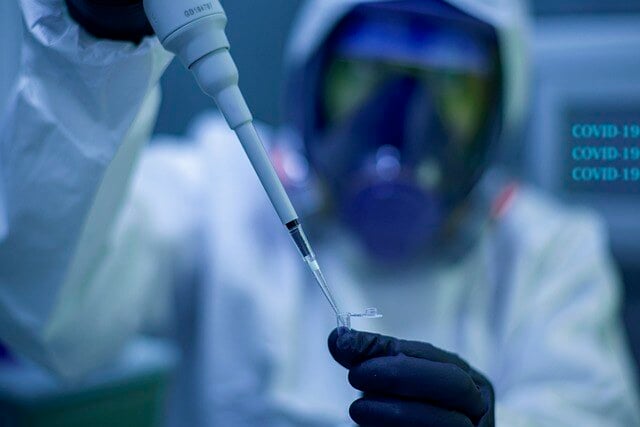Technology rules the roost right now and will continue to do so for the foreseeable future. Not only is tech exploding, but as it develops so we are seeing more industries adopting new technological tools to allow people to work smarter and not harder for their personal benefit and that of the company they work for.
One such arena that is benefitting from advanced technology is the Biotechnology industry, and as such the opportunities for individuals looking to pursue a career in it are becoming vast.
Working in the Biotechnology sector can be a rewarding and lucrative career for several reasons some of which include:
It provides a wide range of career paths and specializations, including research and development, pharmaceuticals, bioinformatics, genetic engineering, and biomanufacturing. This diversity allows you to explore various areas and find the niche that best aligns with your interests and skills.
You'll work in a rapidly evolving field where new technologies and methodologies emerge frequently, which creates an environment conducive to continuous learning, innovation, and personal growth and many companies will want you.
Plus, and probably most importantly, the demand for skilled biotechnologists continues to grow, leading to competitive salaries and relatively stable job prospects compared to many other industries.
Ultimately, choosing to work as a biotechnologist offers the opportunity to be at the forefront of cutting-edge science, improve people's lives, and engage in fulfilling, intellectually stimulating work.
Plus, the average salary of the highest paying biochemist job in the sector can be over $200,000.
Top 10 Best Paying Jobs in Biotechnology 2026 (Inc Salaries)
1. Biomedical Engineer
A Biomedical Engineer is a professional who applies principles of engineering, biology, and medical science to design and create technologies, devices, systems, and software used in healthcare and medicine, and their primary focus is on solving problems related to healthcare and improving patient care by developing innovative solutions.
You'll be working in a job where your work has a significant impact on healthcare, as they contribute to the development of cutting-edge medical technologies, improve patient care, and enhance the diagnosis and treatment of diseases and injuries, and they play a crucial role in advancing the intersection of engineering and medicine, aiming to improve the quality of life for individuals around the world.
Becoming a Biomedical Engineer involves a mix of education and experience, but generally you will need:
A bachelor's degree in biology or biomedical engineering or a related field such as biological engineering, bioengineering, or a traditional engineering discipline (like mechanical or electrical engineering) with a focus on biomedical applications.
During your undergraduate studies, acquire skills in biology, chemistry, physics, mathematics, and engineering principles.
A master's degree or a Ph.D. in biomedical engineering or a specialized field within biomedical engineering which can enhance your job prospects particularly for research or advanced technical positions, or obtaining the Professional Engineer (PE) license after gaining sufficient work experience.
The average annual for a Biomedical Engineer in the US is $82,921.

2. Research Scientist
A Research Scientist is a professional who conduct research and experiments within a specific field or discipline. Their primary responsibility is to design, plan, and execute experiments, studies, or investigations to expand knowledge, solve problems, or develop new technologies.
They play a critical role in advancing scientific knowledge, contributing to technological advancements, and addressing societal challenges, and are integral to the scientific community, driving progress and innovation through their dedication to exploration, experimentation, and discovery.
Becoming a Research Scientist typically involves obtaining a higher education, gaining research experience, and developing specialized skills, but generally you will require:
A bachelor's degree in a scientific field related to your area of interest such as biology, chemistry, physics, computer science, engineering, mathematics, or a specialized field relevant to your desired research area.
Acquiring specialized technical skills and proficiency in laboratory techniques, data analysis, experimental design, and relevant software or programming languages used in your field.
Developing strong analytical and critical thinking skills necessary for designing experiments, analyzing data, and interpreting results.
Pursuing postdoctoral research positions will allow you to gain additional experience, deepen your expertise, and further build your research portfolio to get you in the door to a better career.
The average annual for a Research Scientist in the US is $99,341.
3. Process Engineer
A Process Engineer is a professional who specializes in designing, implementing, optimizing, and managing industrial processes within various industries, and their primary focus is on improving efficiency, quality, safety, and productivity of manufacturing or production processes.
They work in various industries, including manufacturing, biotechnology, chemical processing, pharmaceuticals, food and beverage production, energy, and more, and their contributions are crucial in ensuring efficient and sustainable production processes that meet quality standards and contribute to the overall success of the organization.
Becoming a Process Engineer generally involves obtaining a relevant education, gaining practical experience, and developing specialized skills, but generally you will require: A bachelor's degree in chemical engineering, mechanical engineering, industrial engineering, or a related field.
Taking courses in process engineering, unit operations, thermodynamics, fluid mechanics, materials science, and other relevant subjects to build a strong foundation.
Acquiring proficiency in computer-aided design (CAD) software, process simulation tools (such as Aspen Plus or HYSYS), data analysis tools, and relevant programming languages used in process engineering.
Developing strong analytical and problem-solving skills necessary for analyzing processes, identifying inefficiencies, and proposing improvements. Or, obtaining Certifications such as those related to Six Sigma or professional engineering (PE) licenses, which may be beneficial for certain roles or industries.
The average annual for a Process Engineer in the US is $75,694.
4. Medical Technologist
A Medical Technologist, also known as a clinical laboratory technologist or clinical laboratory scientist, is a highly skilled healthcare professional responsible for performing complex laboratory tests and analyses on various biological specimens.
They work in various healthcare settings, including hospitals, diagnostic laboratories, clinics, research institutions, blood banks, and public health facilities, and their work is crucial in contributing to accurate disease diagnoses, monitoring of treatment effectiveness, and ensuring patient safety and well-being by providing reliable laboratory results to healthcare providers.
Becoming a Medical Technologist typically involves completing specific education requirements, gaining clinical experience, and obtaining certification, but generally you will require:
A bachelor's degree from an accredited program in medical technology, clinical laboratory science, or a related field. Coursework usually includes subjects like biology, chemistry, microbiology, hematology, immunology, and laboratory techniques.
Obtaining certain certifications from the American Society for Clinical Pathology (ASCP), the American Medical Technologists (AMT) and the National Accrediting Agency for Clinical Laboratory Sciences (NAACLS).
Engaging in continuing education programs, workshops, seminars, and conferences to stay updated with the latest technologies, techniques, and best practices, or, considering opportunities for career advancement, such as specialization in a specific area of laboratory science, pursuing higher education (master's or doctoral degrees), or taking on leadership roles within the field.
The average annual for a Medical Technologist in the US is $76,629.
5. Regulatory Affairs Manager
A Regulatory Affairs Manager is a professional responsible for ensuring that companies comply with regulations and laws governing their industry, particularly in highly regulated sectors such as pharmaceuticals, medical devices, biotechnology, food and beverages, cosmetics, and other health-related products.
They play a critical role in ensuring that companies operate within legal and regulatory frameworks, allowing them to bring safe and effective products to market while meeting all compliance standards.
Becoming a Regulatory Affairs Manager generally involves obtaining a relevant education, gaining practical experience, and developing specialized skills, but generally you will require:
A bachelor's degree in a relevant field such as biology, chemistry, pharmacy, life sciences, engineering, or a related discipline.
Pursuing specialized training programs or certifications in regulatory affairs, such as Regulatory Affairs Certification (RAC), offered by professional organizations like the Regulatory Affairs Professionals Society (RAPS) or other relevant certifications based on your industry.
Pursuing a master's degree or higher education in regulatory affairs, public health, or a related field to deepen your knowledge and increase your expertise in regulatory affairs management, or, developing leadership, communication, and management skills necessary for managerial roles by taking on projects, leading teams, and expanding your scope of responsibilities.
The average annual for a Regulatory Affairs Manager in the US is $144,139 and is one of the highest-paying jobs in biotechnology.
6. Business Development Director
A Business Development Director is a senior-level executive responsible for identifying growth opportunities, expanding the business, and creating strategic partnerships to drive revenue and increase market share for a company.
They play a critical role in driving the long-term growth and success of a company by identifying opportunities, fostering relationships, and executing strategies that expand the company's market presence and profitability, and often collaborate closely with various departments, including sales, marketing, finance, and operations, to achieve overall business objectives.
Becoming a Business Development Director typically involves gaining relevant education, acquiring extensive professional experience, developing leadership and strategic skills, and demonstrating a track record of success in business development, but generally you will require:
A bachelor's degree in business administration, marketing, finance, economics, or a related field. Honing skills in market research, strategic planning, negotiation, relationship building, sales techniques, financial analysis, and project management.
Proficiency in CRM (Customer Relationship Management) software and business development tools is also valuable.
Pursuing an advanced degree like an MBA or relevant certifications in business development or strategic management which can enhance your knowledge and credibility in the field, or, enhancing leadership capabilities, as Business Development Directors need strong leadership qualities to guide teams, set strategic direction, and inspire others.
The average annual for a Business Development Director in the US is $202,362 and is one of the 5 high-paying careers in biotechnology.
7. Biostatistician
A Biostatistician is a professional who applies statistical methods to analyze and interpret data in the fields of biology, medicine, healthcare, and life sciences, and play a crucial role in research, clinical trials, epidemiology, public health, and various areas of biological and medical sciences by using statistical techniques to draw meaningful conclusions from data.
They often work in various settings, including academia, research institutions, pharmaceutical companies, healthcare organizations, government agencies, and consulting firms.
Becoming a Biostatistician typically involves obtaining specific education, gaining practical experience in statistics and related fields, and developing specialized skills in statistical analysis, but generally you will require:
A bachelor's degree in statistics, mathematics, biostatistics, biology, public health, or a related field, ensuring that your coursework includes statistical methods, mathematics, and programming languages such as R or Python.
Pursuing a master's degree or Ph.D. in biostatistics, statistics, epidemiology, or a related field for more advanced positions.
Acquiring a strong foundation in statistical theory, study design, probability, regression analysis, experimental design, and data analysis techniques.
Gaining proficiency in statistical software commonly used in biostatistics, such as SAS, R, SPSS, STATA, or Python.
Familiarity with these tools is essential for analyzing and interpreting data, or, obtaining certifications relevant to biostatistics, such as the SAS Certified Statistical Business Analyst Using SAS 9, which can enhance your credibility and expertise in statistical analysis.
The average annual for a biostatistician in the US is $130,052 and is one of the high-paying jobs in biotechnology.

8. Software Engineer
A Software Engineer is a professional who applies engineering principles to the design, development, testing, and maintenance of software systems and applications.
They work in the field where they are responsible for creating software solutions to address specific needs or problems, utilizing their expertise in programming languages, algorithms, data structures, and software development methodologies, and might work in various industries like technology, finance, healthcare, entertainment, and more, contributing to the development of innovative software products and systems.
Becoming a Software Engineer involves a combination of education, practical experience, and continuous learning, but generally you will require:
A degree in computer science, software engineering, computer engineering, or a related field. A solid foundation in computer science concepts like algorithms, data structures, programming languages, and software development principles is crucial.
Supplementing your formal education with online courses, tutorials, and resources available on platforms like Coursera, edX, Khan Academy, freeCodeCamp, and others. Learning programming languages commonly used in software development such as Python, Java, JavaScript, C++, or others depending on your area of interest.
Considering pursuing advanced degrees or certifications to specialize in specific areas like machine learning, cybersecurity, or cloud computing, depending on your interests.
The average annual for a Software Engineer in the US is $118,000.
9. Pharmacist
A Pharmacist is a healthcare professional who specializes in the field of pharmacy. They oversee the preparation, dispensing, and proper use of medications, and play a crucial role in healthcare by ensuring the safe and effective use of prescription and over-the-counter medications.
They work in various settings, including retail pharmacies, hospitals, clinics, pharmaceutical companies, long-term care facilities, and government agencies.
Becoming a pharmacist involves several steps and specific educational requirements, but generally you will require:
A bachelor's degree in a relevant field such as biology, chemistry, biochemistry, or pre-pharmacy studies, but ensure that your coursework includes prerequisites for pharmacy school, which may vary but commonly include biology, chemistry, physics, mathematics, and humanities.
Apply to an accredited Doctor of Pharmacy (Pharm.D.) program. Pharm.D. programs typically take four years to complete.
After completing the Pharm.D. program, you must pass the North American Pharmacist Licensure Examination (NAPLEX) and, in some states, the Multistate Pharmacy Jurisprudence Examination (MPJE) to obtain a license to practice as a pharmacist.
The average annual for a Pharmacist in the US is $150,719 and is one of the highest paying jobs for biotechnology.
10. Chief Medical Officer
A Chief Medical Officer (CMO) is a high-ranking executive within a healthcare organization or a company involved in the healthcare industry, and play a pivotal role in overseeing and guiding the medical policies, strategies, and clinical operations of the organization.
The role of a CMO is critical in ensuring that the healthcare organization maintains high standards of patient care, remains compliant with regulations, and continually improves its clinical operations to meet the evolving needs of patients and the healthcare industry.
Becoming a Chief Medical Officer (CMO) typically requires a combination of education, extensive clinical experience, leadership skills, and a strong understanding of healthcare administration, but generally you will require:
A medical degree (MD or DO) from an accredited medical school. This typically involves completing a bachelor's degree, followed by four years of medical school.
Gaining substantial clinical experience by working in various healthcare settings, hospitals, clinics, or medical practices, or considering pursuing advanced degrees or certifications in healthcare administration, public health, business administration (such as an MBA), or a related field.
The average annual for a Chief Medical Officer in the US is $227,380 and is one of the highest paying biotechnology jobs.
Conclusion
The Biotechnology sector offers numerous advantages and opportunities for individuals looking to build a career in this field.
If you are interested in a career in a sector that provides opportunities for meaningful work, professional growth, and the chance to contribute to significant advancements that benefit society while offering diverse career paths across various industries and specialties, this is a job for you.
In addition, Biotechnology careers often offer competitive salaries, especially for roles requiring specialized skills or advanced degrees. Entry-level jobs also offer competitive salaries.
If you are looking to start what can promise to be a lucrative job as a Biotechnologist, there are many ways to get there.
To land one of the varied jobs in the industry, it would be best to consider on the job training, gaining certificates, or obtaining either a Online BBA or an Online MBA degree from an internationally- recognized university such as Nexford.
FAQs - Highest Paying Jobs For Biotechnology Majors
Below are some of the most frequently asked questions we get about biotechnology jobs and career roles:
What is the highest paying biotechnology job?
From our research, it's clear that the best paying biotechnology career is a Chief Medical Officer, with the average annual salary in the US being $227,380.
Is Biotechnology a good career path?
Yes, biotechnology can be a rewarding and promising career path for individuals interested in the intersection of biology, technology, and innovation for several reasons.
It is at the forefront of scientific and technological advancements. It involves using biological systems, organisms, or living cells to develop products and technologies that improve human health, agriculture, environmental sustainability, and more.
It offers diverse career opportunities across various sectors, including pharmaceuticals, healthcare, agriculture, environmental science, bioinformatics, genetics, and research and development.
Due to the increasing demand for innovative solutions in healthcare, agriculture, and environmental sustainability, there is a growing need for skilled biotechnologists, scientists, researchers, engineers, and technicians.
And last, but not least, careers in biotechnology often offer competitive salaries, especially for those with advanced degrees and specialized skills.
What skills are needed to become a biotechnology professional?
To succeed in the field of biotechnology, professionals require a blend of technical, analytical, and soft skills. A strong foundation in biology, biochemistry, chemistry, molecular biology, genetics, and related scientific disciplines.
Proficiency in various laboratory techniques such as DNA sequencing, PCR (Polymerase Chain Reaction), cell culture, protein purification, chromatography, microscopy, and other molecular biology and biotechnology methods.
Ability to analyze and interpret complex biological data, perform statistical analyses, and draw meaningful conclusions from experimental results or bioinformatics analyses.
Precision and attention to detail to ensure accuracy in experimental procedures, data recording, and analysis. The ability to adapt to new technologies, methodologies, and scientific advancements.
Understanding regulatory requirements and compliance in areas such as bioethics, biosafety, and industry standards, especially if you are working in pharmaceuticals or clinical research.
Do you need a degree to become a biotechnologist?
While having a degree significantly enhances your prospects and opportunities in the field of biotechnology, it's not always a strict requirement in every role.
However, a formal education, typically in the form of a degree, greatly enhances your knowledge base, skill set, and credibility within the industry.
For many entry-level positions in biotechnology, a bachelor's degree in a related field such as biology, biochemistry, biotechnology, molecular biology, chemistry, or a similar discipline is often required by employers.
This degree provides fundamental knowledge and laboratory skills necessary to start a career in the field.
Higher positions or specialized roles within biotechnology, such as research scientist, laboratory manager, or biotech consultant, often require advanced degrees (master's or Ph.D.) due to the increased depth of knowledge and expertise needed in these roles.
In some cases, especially for technical or hands-on positions, employers may consider candidates with relevant certifications, extensive experience, or demonstrated proficiency in laboratory techniques and specific technologies even if they lack a formal degree.
However, having a degree often opens more doors and provides a broader understanding of the field.
Taking all of that into consideration, even after securing a job without a degree, pursuing continuing education, certifications, workshops, and specialized training can be beneficial for career advancement and staying competitive in the rapidly evolving biotechnology industry.
How can I progress my career in a biotech role?
Progressing your career in a biotech role involves a combination of gaining experience, developing skills, continuous learning, networking, and seeking opportunities for advancement.
If you want to get a step ahead of the field, there are some steps you can take to advance your career in the biotech industry.
Stay updated with the latest advancements, technologies, and trends in biotechnology by attending workshops, seminars, webinars, and relevant conferences.
Pursue additional certifications, specialized training, or advanced degrees (if feasible) to deepen your expertise in specific areas of biotechnology. Engage with professionals in the field by attending industry events, joining professional associations, and connecting with peers, mentors, and leaders.
Networking can lead to valuable opportunities, mentorship, and career advice. Take on leadership roles in projects, mentor junior colleagues, or propose and lead initiatives that contribute to the company's success.
Show initiative, innovative thinking, and a proactive approach to problem-solving. Focus on developing soft skills such as communication, leadership, teamwork, adaptability, and project management.
These skills are crucial for advancement into higher-level roles. And, be open to exploring opportunities outside your current organization if it aligns with your career goals.
Sometimes, advancement may come from moving to a different company or taking on a new role in a different sector of biotechnology.
Is a career in biotechnology the best option in 2026?
Determining the "best" career option depends on individual interests, strengths, career goals, market demand, and the evolving landscape of various industries.
In 2026 and beyond, a career in biotechnology continues to be a promising and impactful field for several reasons.
Biotechnology remains at the forefront of innovation, with continuous advancements in areas such as personalized medicine, gene editing, synthetic biology, and biopharmaceuticals.
The demand for biotechnologists, scientists, researchers, and professionals with expertise in biotechnology continues to increase.
Biotechnology encompasses various sectors, including pharmaceuticals, healthcare, agriculture, bioinformatics, genetic engineering, environmental science, and more. This diversity provides a wide range of career paths and opportunities for specialization.
Biotechnology intersects with other cutting-edge technologies like artificial intelligence, big data analytics, and robotics, leading to innovative collaborations and the potential for interdisciplinary work.
Subscribe to our newsletter
Don't miss out on our latest updates.
Unlock Your Potential: Explore Our Programs
Invest in yourself and your future. Discover our range of degrees, courses, and certificates to achieve your goal
Table of Contents
- Top 10 Best Paying Jobs in Biotechnology 2026 (Inc Salaries)
- Biomedical Engineer
- Research Scientist
- Process Engineer
- Medical Technologist
- Regulatory Affairs Manager
- Business Development Director
- Biostatistician
- Software Engineer
- Pharmacist
- Chief Medical Officer
- Conclusion
- FAQs - Highest Paying Jobs For Biotechnology Majors







